 Petzlover
Petzlover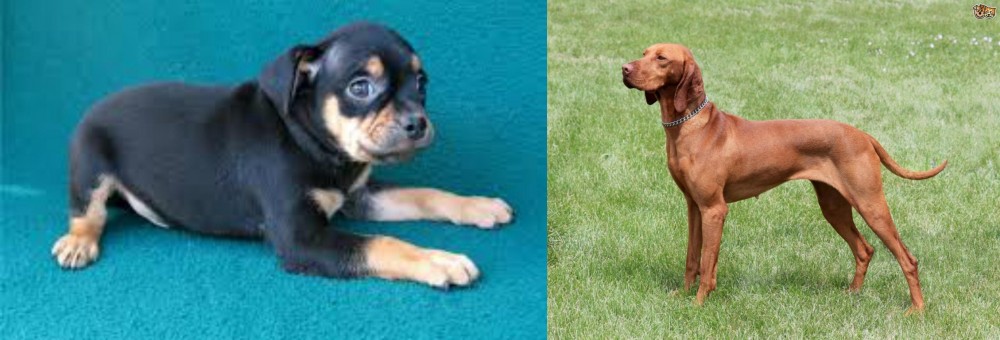 Carlin Pinscher is originated from France but Hungarian Vizsla is originated from Hungary. Carlin Pinscher may grow 31 cm / 12 inches shorter than Hungarian Vizsla. Carlin Pinscher may weigh 24 kg / 52 pounds lesser than Hungarian Vizsla. Carlin Pinscher may live 5 years more than Hungarian Vizsla. Carlin Pinscher may have more litter size than Hungarian Vizsla. Both Carlin Pinscher and Hungarian Vizsla requires Low Maintenance.
Carlin Pinscher is originated from France but Hungarian Vizsla is originated from Hungary. Carlin Pinscher may grow 31 cm / 12 inches shorter than Hungarian Vizsla. Carlin Pinscher may weigh 24 kg / 52 pounds lesser than Hungarian Vizsla. Carlin Pinscher may live 5 years more than Hungarian Vizsla. Carlin Pinscher may have more litter size than Hungarian Vizsla. Both Carlin Pinscher and Hungarian Vizsla requires Low Maintenance.
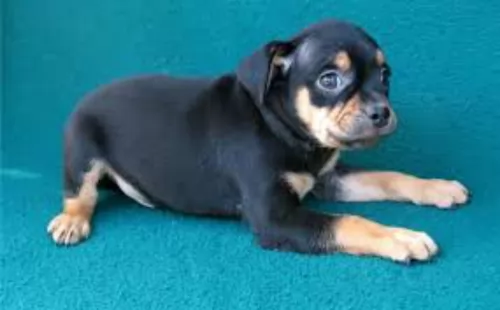 There are conflicting views as to where the Carlin Pinscher hails from, with some reports saying France and others the USA. The names of some breeders suggest it could be France.
There are conflicting views as to where the Carlin Pinscher hails from, with some reports saying France and others the USA. The names of some breeders suggest it could be France.
The dog hasn’t got a long history, being developed only in the early 1900s. Two breeders, Morgan and Buenafe left their Miniature Pinscher with a Pug owner for a while and on return discovered that the dogs had mated, producing puppies which looked like miniature Rottweilers.
It was in 1998 that a breeding program began and a Boxer was also brought into the mix to improve the characteristics of the dog. The dog is still being developed and isn’t recognized by the major kennel clubs.
 The Hungarian Vizslas existed in the land that is now Hungary, the Pannonian Basin, at least since the 10th century when they were shown on etchings. It is thought that their descendants were various pointers, the extinct Turkish Yellow Dog and the Transylvanian Hound. The Vizsla is a hunting dog with the word being Hungarian for pointer. In 1937 the Carmelite Friars under orders from King Louis I of Hungry. The breed was isolated for centuries in the Basin by the aristocracy and land owners.
The Hungarian Vizslas existed in the land that is now Hungary, the Pannonian Basin, at least since the 10th century when they were shown on etchings. It is thought that their descendants were various pointers, the extinct Turkish Yellow Dog and the Transylvanian Hound. The Vizsla is a hunting dog with the word being Hungarian for pointer. In 1937 the Carmelite Friars under orders from King Louis I of Hungry. The breed was isolated for centuries in the Basin by the aristocracy and land owners.
The Magyar people of the area developed the breed for hunting as both pointers and retrievers. They were excellent at hunting rabbits and water fowl. With a terrific sense of smell and boundless stamina and energy, the were prized as family and companion dogs as well. This was unusual for a hunting or working dog. Their size made them appealing as well. They were small by comparison to other hunting dogs both pointers and retrievers.
Easy to train, the Hungarian Vizsla works in water, forests and fields. They are able to retrieve in the water as well as on the land. Throughout their history, the breed outlasted the Turkish Revolution, the Hungarian Revolution World War 1 and World War 2, as well as the Hungarian People’s Republic Communist State. Things were a little dicey for the Vizlas several times beginning in the 1800’s when German Shorthaired Pointers and English Pointers were introduced into the area. The next time was after World War II. Fearful of what this Communist state would mean for the breed, some were smuggled into the United States and Austria.
At that time there were only a dozen or so Vizslas in all of Hungary. Their numbers were brought back from that small breeding stock. This history did result in several different strains grew into their own breeding stock. There are Vizslas in Czechoslovakia, Romania, Serbia and Austria. There developed separate lines that became separate breeds in the Wirehaired Vizsla and the longhaired Vizsla which is very rare.
After World War II, the Hungarian Vizsla came to the United States and the Vizsla Club of American was established as a first step toward AKC (American Kennel Club) recognition. This was attained in 1960. Rex del Geisimino came to the U.S. in 1951 and he was able to respond to commands in both German and Hungarian. Vizslas also came to the United Kingdom in this time frame. There are now about 4500 registered with the KC (Kennel Club of Great Britain). A Vizsla won the distinctive Crufts Dog Show in Great Britain, as Best in Show.
It is believed that this gentle, sensitive and affectionate hunter was part of the original breeding stock or the Wirehaired Vizsla, the Weimaraner and the German Shorthaired Pointers. The Hungarian Vizsla is intelligent and social. The need your attention as well as a lot of exercise to avoid destructive behavior born of boredom. They want to be with you and they can be very protective of you.
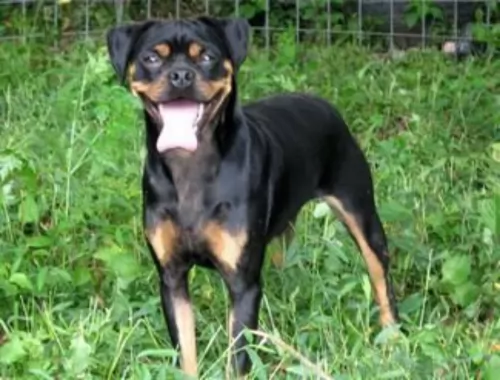 The Carlin Pinscher has been developed to be a social and loving companion. Started as a cross between a Miniature Pinscher and Pug, other breeds have also been brought in. He still has varied appearances, often looking like a tiny Rottweiler but also looking like anything between the Miniature Pinscher or the Pug.
The Carlin Pinscher has been developed to be a social and loving companion. Started as a cross between a Miniature Pinscher and Pug, other breeds have also been brought in. He still has varied appearances, often looking like a tiny Rottweiler but also looking like anything between the Miniature Pinscher or the Pug.
This is a small sized dog standing at anything from 27- to 33 cm and weighing 5 or 6kg. The body is compact with sturdy legs coming from the Pug side. The skull is a dome shape, the ears can be erect or floppy and unless the tail is docked it can be long, curling somewhat over the back. The coat is short and smooth and comes in shades of tan, brown and black.
The Carlin Pinscher is small but with a strong personality, being gentle and sweet in nature. He promises to be a loyal and affectionate companion for his human family, loving to be involved in all their activities.
He is an energetic, playful little dog and also intelligent, so apart from a walk and ball games, he’ll need some toys for indoors too that can provide physical- and mental stimulation. With early training and socialization, the Carlin Pinscher is a good friend of children and he will get on well with other pets in the house too. He is a small dog so children should be supervised and taught to handle him with gentleness and kindness.
 The Hungarian Vizsla has a light build, a short coat, and a distinctive bearing. They are medium in size and muscular, lean dogs looking a lot like the Weimaraner. They are also close in appearance to the Rhodesian Ridgeback and the Redbone Coonhounds. They are more muscular and leaner than the Rhodesian Ridgeback and Weimaraner.
The Hungarian Vizsla has a light build, a short coat, and a distinctive bearing. They are medium in size and muscular, lean dogs looking a lot like the Weimaraner. They are also close in appearance to the Rhodesian Ridgeback and the Redbone Coonhounds. They are more muscular and leaner than the Rhodesian Ridgeback and Weimaraner.
The Vizsla has a reddish nose and their nails and eyes should also be reddish or blending with the color of their coat. They have docked tails in the American standard but not in the United Kingdom, as docking is banned there. If he has a tail, you can see it flying through the air as he runs through the rough land to retrieve fowl.
They have a domed skull with a tapered muzzle that is shorter or equal to the skull. They have eyes that are contrasted with the coat and of medium size. The ears of silky, hang close to the face and the tips are rounded. The coat is rust in color with many shades. He also has a deep chest and hound like face.
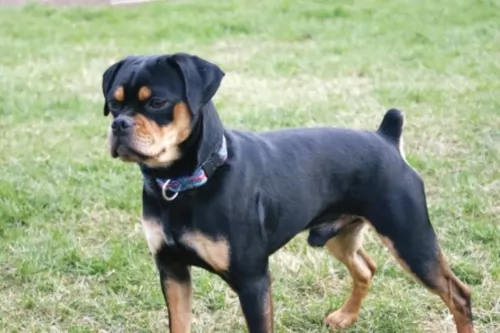 The Carlin Pinscher makes an ideal little pet and he will be content to live in a small home in the city or in the country, just so long as he is with an owner who loves and cares for him. They are balanced, easy-to-get-along-with dogs, being even-tempered, playful and outgoing.
The Carlin Pinscher makes an ideal little pet and he will be content to live in a small home in the city or in the country, just so long as he is with an owner who loves and cares for him. They are balanced, easy-to-get-along-with dogs, being even-tempered, playful and outgoing.
He is active, intelligent, strong-willed, stubborn and brave. It is true that people who have kept mixed-breed dogs rave about them. Certainly mixed breed dogs have earned themselves a reputation for being superb family pets. They’re healthy, feisty, quaint and entertaining.
These days many mixed breeds are no longer pavement specials but part of careful breeding, such as with the Carlin Pinscher. He is full of personality and makes a great family pet, getting along with other animals and also being good around children.
 Children friendliness - The Vizsla is very good with children.
Children friendliness - The Vizsla is very good with children.
Special talents - They are both excellent pointers and retrievers.
Adaptability - They are not very adaptable in living arrangements as they are much more suited for the country than the city.
Learning ability – The Vizsla is a very intelligent breed and easy to train. His learning ability is very high.
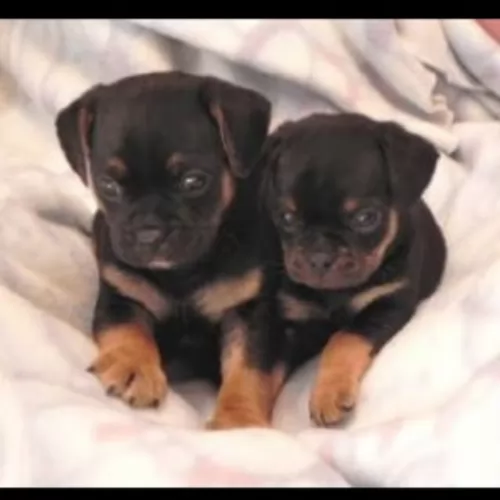 The Carlin Pinscher is a feisty little dog who can live to be up to 13, 14 or 15 years of age. He is a fairly healthy breed too, but there will always be some issues that the Carlin Pinscher might be prone to. Typical dog ailments include eye problems, hip dysplasia, liver problems, skin- and dental problems.
The Carlin Pinscher is a feisty little dog who can live to be up to 13, 14 or 15 years of age. He is a fairly healthy breed too, but there will always be some issues that the Carlin Pinscher might be prone to. Typical dog ailments include eye problems, hip dysplasia, liver problems, skin- and dental problems.
All liver problems with a dog are serious and will need veterinary intervention. A noticeable symptom of liver disease is jaundiced yellowing of the white of the eye. You might even see a yellowing on the underside of the ear flap. Your pet will have loss of appetite, constipation as well as highly colored urine.
 The Hungarian Vizsla has a series of health issues that include:
The Hungarian Vizsla has a series of health issues that include:
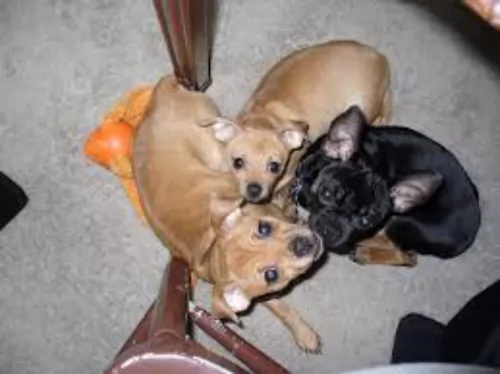 With his short, smooth coat, the Carlin Pinscher is a low to moderate shedder who is easy to maintain. The short coat will simply need a brush-down twice a week to rid him of loose hairs. If he is dusty, you can wipe the coat down with a warm, damp cloth.
With his short, smooth coat, the Carlin Pinscher is a low to moderate shedder who is easy to maintain. The short coat will simply need a brush-down twice a week to rid him of loose hairs. If he is dusty, you can wipe the coat down with a warm, damp cloth.
Every dog, large or small needs a balanced diet that consists of proteins, fats, vitamins, minerals and carbohydrates. A well balanced diet keeps a dog healthy but also in shape. A dog requires certain ingredients in its diet, depending on age, activity levels, size and stage of life such as pregnancy or illness.
For starters, dogs need fresh, cool water at all times. If you’re confused about dry kibble or semi-moist dog food for instance, speak to your vet about what your Carlin Pinscher needs. It’s always good to give your pet variety, so mixing in some rice, vegetables and meat will be wonderful for your pet as will some raw meat from time to time.
 Feed two to four cups per day of a high quality dry dog food. Break this up into three or four meals. Don’t free feed your puppy.
Feed two to four cups per day of a high quality dry dog food. Break this up into three or four meals. Don’t free feed your puppy.
Feed two to three cups per day of high quality dry dog food. Feed in two servings.
The Vizsla is an athlete with high energy.
The Hungarian Vizsla needs at least 30 minutes of exercise every day and maybe more. He needs a large yard or open field, but daily brisk walks will do if that is all that is possible. He needs to be stimulated intellectually as well and enjoys fetch, jogging with you, lure coursing, field trials, tracking and scent work, confirmation, agility, barn hunt, dock diving, rally, and obedience.